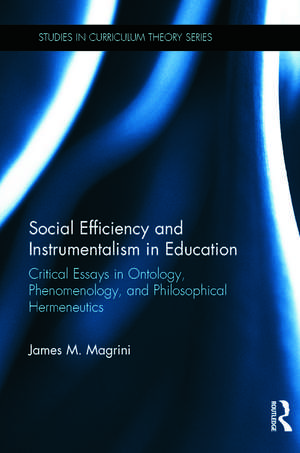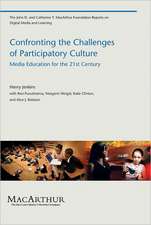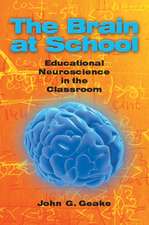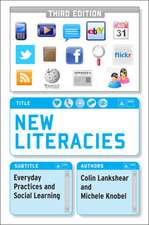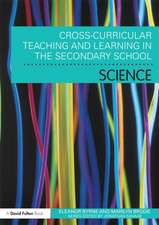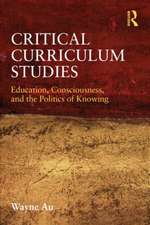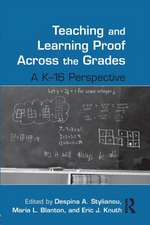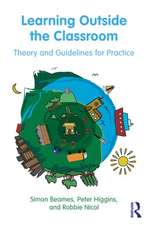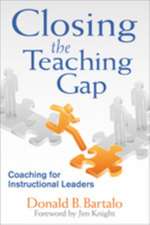Social Efficiency and Instrumentalism in Education: Critical Essays in Ontology, Phenomenology, and Philosophical Hermeneutics: Studies in Curriculum Theory Series
Autor James M. Magrinien Limba Engleză Hardback – 28 apr 2014
| Toate formatele și edițiile | Preț | Express |
|---|---|---|
| Paperback (1) | 356.18 lei 43-57 zile | |
| Taylor & Francis – 18 noi 2016 | 356.18 lei 43-57 zile | |
| Hardback (1) | 1052.85 lei 43-57 zile | |
| Taylor & Francis – 28 apr 2014 | 1052.85 lei 43-57 zile |
Din seria Studies in Curriculum Theory Series
- 9%
 Preț: 805.64 lei
Preț: 805.64 lei - 8%
 Preț: 381.85 lei
Preț: 381.85 lei -
 Preț: 198.48 lei
Preț: 198.48 lei -
 Preț: 144.72 lei
Preț: 144.72 lei -
 Preț: 311.56 lei
Preț: 311.56 lei -
 Preț: 311.41 lei
Preț: 311.41 lei -
 Preț: 310.71 lei
Preț: 310.71 lei -
 Preț: 385.21 lei
Preț: 385.21 lei -
 Preț: 385.63 lei
Preț: 385.63 lei -
 Preț: 313.24 lei
Preț: 313.24 lei -
 Preț: 302.84 lei
Preț: 302.84 lei -
 Preț: 310.99 lei
Preț: 310.99 lei -
 Preț: 421.63 lei
Preț: 421.63 lei -
 Preț: 475.62 lei
Preț: 475.62 lei - 18%
 Preț: 1325.44 lei
Preț: 1325.44 lei - 18%
 Preț: 1160.51 lei
Preț: 1160.51 lei - 18%
 Preț: 1952.87 lei
Preț: 1952.87 lei -
 Preț: 431.77 lei
Preț: 431.77 lei - 18%
 Preț: 1163.63 lei
Preț: 1163.63 lei -
 Preț: 442.50 lei
Preț: 442.50 lei - 18%
 Preț: 1168.40 lei
Preț: 1168.40 lei -
 Preț: 443.49 lei
Preț: 443.49 lei - 18%
 Preț: 964.83 lei
Preț: 964.83 lei -
 Preț: 481.38 lei
Preț: 481.38 lei -
 Preț: 482.35 lei
Preț: 482.35 lei -
 Preț: 487.10 lei
Preț: 487.10 lei -
 Preț: 473.71 lei
Preț: 473.71 lei - 18%
 Preț: 1275.40 lei
Preț: 1275.40 lei - 18%
 Preț: 840.69 lei
Preț: 840.69 lei - 18%
 Preț: 1000.27 lei
Preț: 1000.27 lei -
 Preț: 439.62 lei
Preț: 439.62 lei -
 Preț: 482.35 lei
Preț: 482.35 lei -
 Preț: 442.50 lei
Preț: 442.50 lei - 18%
 Preț: 975.98 lei
Preț: 975.98 lei - 18%
 Preț: 1161.62 lei
Preț: 1161.62 lei - 18%
 Preț: 1168.40 lei
Preț: 1168.40 lei - 18%
 Preț: 1109.18 lei
Preț: 1109.18 lei - 18%
 Preț: 1000.30 lei
Preț: 1000.30 lei -
 Preț: 479.09 lei
Preț: 479.09 lei - 18%
 Preț: 1053.16 lei
Preț: 1053.16 lei - 18%
 Preț: 1164.24 lei
Preț: 1164.24 lei
Preț: 1052.85 lei
Preț vechi: 1283.96 lei
-18% Nou
Puncte Express: 1579
Preț estimativ în valută:
201.53€ • 218.98$ • 169.39£
201.53€ • 218.98$ • 169.39£
Carte tipărită la comandă
Livrare economică 21 aprilie-05 mai
Preluare comenzi: 021 569.72.76
Specificații
ISBN-13: 9780415744003
ISBN-10: 0415744008
Pagini: 202
Dimensiuni: 152 x 229 x 15 mm
Greutate: 0.4 kg
Ediția:1
Editura: Taylor & Francis
Colecția Routledge
Seria Studies in Curriculum Theory Series
Locul publicării:Oxford, United Kingdom
ISBN-10: 0415744008
Pagini: 202
Dimensiuni: 152 x 229 x 15 mm
Greutate: 0.4 kg
Ediția:1
Editura: Taylor & Francis
Colecția Routledge
Seria Studies in Curriculum Theory Series
Locul publicării:Oxford, United Kingdom
Cuprins
Acknowledgements
Introduction:
Practicing Education-Philosophy Curriculum as Phenomenological Text and the European Tradition in Existential-Phenomenological Philosophy
Chapter One:
The Historical Milieu of Social Efficiency Locating the Problem of the Loss or Forgetting of Phenomenological Self-Hood
A Philosophical Overview The Influence of Positivism on Education
The Rise of Society in Education World-Alienation in Arendt’s Philosophy
The Crisis of Alienation in Contemporary Education Philosophical Fall-Out in Practice
Defining Phenomenological Self-Hood A Fundamental Ontological Vista into Human Dasein
Chapter Two:
The Destruktion of the Language of Learning in Social Efficiency Language and Conceptualization in Phenomenological Ontology and Original Learning
Reconceptualizing the Language of Learning
The Ontology of Original Learning as Being-Educated
Ontological Learning and the Language of "Original" Questions
Chapter Three:
Phenomenology and Curriculum Inquiry Understanding the Methods of Willis, van Manen, and Heidegger
Setting the Historical Scene
The Phenomenology of George Willis
The Phenomenological Ontology of van Manen and Heidegger
Apologia: A Defense of Phenomenological Research
Chapter Four:
Philosophical Hermeneutics Socrates and the Ethos of Dwelling in a Philosophical Community of Original Learning as Bildung
Human Transcendence as Hermeneutic Interpretation The Ethos of Becoming Other in the Face of Radical Alterity
Transformation and Formation in Original Learning Bildung, Bildung Haben, and Außerschulische Bildung
The Context of Human Dwelling as Hermeneutic Interpretation Socrates and the Philosophical Community of Original Learners
Lingering Resonations
Chapter Five:
Huebner’s Reading of Heidegger’s Fundamental Ontology The Authentic Re-Conceptualization of Learning, Historicity, and Temporality for Contemporary Education
Huebner’s Authentic View of Education Through Heidegger’s Conceptual Lens The Phenomenological Concern with Temporality and Historicity
Huebner’s Heidegger Potential Implications for an Authentic Education
Transcendence, Liberation, and Emancipation
Chapter Six:
Cosmopolitanism and Curriculum in a New Key The Complicated Philosophical Conversations of Pinar and Aoki
Cosmopolitan Curriculum as Polyphonic Discourse Orality and the Potential for Authentic Conversation
Curriculum in a New Key Listening for the Reticent Call of Authentic Curriculum
The Theoria-Praxis Continuum and the Space of Curriculum Theorizing
Epilogue:
Releasing our Potential-for-Being into the Indeterminate Future of Education’s Past
Introduction:
Practicing Education-Philosophy Curriculum as Phenomenological Text and the European Tradition in Existential-Phenomenological Philosophy
Chapter One:
The Historical Milieu of Social Efficiency Locating the Problem of the Loss or Forgetting of Phenomenological Self-Hood
A Philosophical Overview The Influence of Positivism on Education
The Rise of Society in Education World-Alienation in Arendt’s Philosophy
The Crisis of Alienation in Contemporary Education Philosophical Fall-Out in Practice
Defining Phenomenological Self-Hood A Fundamental Ontological Vista into Human Dasein
Chapter Two:
The Destruktion of the Language of Learning in Social Efficiency Language and Conceptualization in Phenomenological Ontology and Original Learning
Reconceptualizing the Language of Learning
The Ontology of Original Learning as Being-Educated
Ontological Learning and the Language of "Original" Questions
Chapter Three:
Phenomenology and Curriculum Inquiry Understanding the Methods of Willis, van Manen, and Heidegger
Setting the Historical Scene
The Phenomenology of George Willis
The Phenomenological Ontology of van Manen and Heidegger
Apologia: A Defense of Phenomenological Research
Chapter Four:
Philosophical Hermeneutics Socrates and the Ethos of Dwelling in a Philosophical Community of Original Learning as Bildung
Human Transcendence as Hermeneutic Interpretation The Ethos of Becoming Other in the Face of Radical Alterity
Transformation and Formation in Original Learning Bildung, Bildung Haben, and Außerschulische Bildung
The Context of Human Dwelling as Hermeneutic Interpretation Socrates and the Philosophical Community of Original Learners
Lingering Resonations
Chapter Five:
Huebner’s Reading of Heidegger’s Fundamental Ontology The Authentic Re-Conceptualization of Learning, Historicity, and Temporality for Contemporary Education
Huebner’s Authentic View of Education Through Heidegger’s Conceptual Lens The Phenomenological Concern with Temporality and Historicity
Huebner’s Heidegger Potential Implications for an Authentic Education
Transcendence, Liberation, and Emancipation
Chapter Six:
Cosmopolitanism and Curriculum in a New Key The Complicated Philosophical Conversations of Pinar and Aoki
Cosmopolitan Curriculum as Polyphonic Discourse Orality and the Potential for Authentic Conversation
Curriculum in a New Key Listening for the Reticent Call of Authentic Curriculum
The Theoria-Praxis Continuum and the Space of Curriculum Theorizing
Epilogue:
Releasing our Potential-for-Being into the Indeterminate Future of Education’s Past
Notă biografică
Dr. James M. Magrini teaches Western Philosophy and Ethics at College of Dupage, USA.
Recenzii
"Social Efficiency and Instrumentalism in Education is a bold and engaging book, opening up much fertile ground for future work. I find it to be both insightful and admirable, and a masterly success."- George Lăzăroiu, PhD, Linguistic and Philosophical Investigations
"This is an important book. In Social Efficiency and Instrumentalism in Education: Critical Essays in Ontology, Phenomenology, and Philosophical Hermeneutics, James Magrini maps out in great detail a long and complex history, the memory and origins of which have nearly faded from explicit view. We all still suffer it, often in bewildered ways, without quite knowing what has happened to us."- Christopher Gilham & David W. Jardine, Teachers College Record
"What is education, and what is it for? What does learning authentically mean? How does hermeneutics teach us to read classrooms as living phenomenological texts? What do we learn there that can help us transcend the nihilistic enframing of education? Deeply researched and replete with insight, Magrini’s book fearlessly confronts our growing educational crisis by reopening such questions and refusing to foreclose them with premature answers or superficial solutions. In this way, Magrini shows us how ontological questioning allows us to rediscover the past, reinvigorate the present, and transform the future of education." —Professor Iain Thomson, University of New Mexico, USA
"Magrini uniquely and convincingly weaves together the broad range of topics from ontology, phenomenology, and hermeneutics in educational studies with urgent problems in education policy worldwide, which is plagued with very few exceptions by standardization and accountability measures. This erudite volume with great intellectual power is both a theoretical articulation and a healing response to the present worldwide ill-being of education systems, institutions, and individuals." —Tero Autio, Tallinn University, Estonia
"On the pages of Magrini’s book you will find a master teacher and learner who clearly lives philosophy and education. And that, I think, is chiefly the message that he imparts: that it is in the lived act of learning and questioning that another learner can be coaxed into engaging the authentic purpose of education: i.e., the hard work of building communal meaning structures for the world that presents itself to us. I wager that, like me, you will be delighted to join Magrini in that critical project and be the better for it." —Daniel T. Primozic, The Center for American and International Law, Institute for Law Enforcement Administration, USA
"In this brilliant and inspirational book Magrini shows how our contemporary approach to education is dominated by technical, instrumental, and scientific approaches that aim at the production of knowledge with a view to social efficiency which forecloses the original dimension of an authentic educational experience. Magrini demonstrates how that original dimension can be accessed through an educational approach that animates the ontological, phenomenological, and hermeneutic aspects of human existence, awakening us to our potentialities for living otherwise. This book should be essential reading for anyone concerned with where education is headed, both today and tomorrow." —William McNeill, DePaul University, USA
"Magrini has succeeded in writing a book that is a veritable Bible of references and at the same time a feat of philosophy in its own right. His book is vital for anyone seeking to know the state of phenomenology in relation to education, and also for those who are looking for alternative ways to think about education beyond the social efficiency governing contemporary education. Reading Magrini’s book, and to echo what he writes in chapter six, 'we are reminded that if we have brought the current educational systems, institutions, and artifacts into existence, we hold the power to reconceptualize, reinterpret, and ultimately change them’." —Professor Elias Schwieler – Stockholm University
"This is an important book. In Social Efficiency and Instrumentalism in Education: Critical Essays in Ontology, Phenomenology, and Philosophical Hermeneutics, James Magrini maps out in great detail a long and complex history, the memory and origins of which have nearly faded from explicit view. We all still suffer it, often in bewildered ways, without quite knowing what has happened to us."- Christopher Gilham & David W. Jardine, Teachers College Record
"What is education, and what is it for? What does learning authentically mean? How does hermeneutics teach us to read classrooms as living phenomenological texts? What do we learn there that can help us transcend the nihilistic enframing of education? Deeply researched and replete with insight, Magrini’s book fearlessly confronts our growing educational crisis by reopening such questions and refusing to foreclose them with premature answers or superficial solutions. In this way, Magrini shows us how ontological questioning allows us to rediscover the past, reinvigorate the present, and transform the future of education." —Professor Iain Thomson, University of New Mexico, USA
"Magrini uniquely and convincingly weaves together the broad range of topics from ontology, phenomenology, and hermeneutics in educational studies with urgent problems in education policy worldwide, which is plagued with very few exceptions by standardization and accountability measures. This erudite volume with great intellectual power is both a theoretical articulation and a healing response to the present worldwide ill-being of education systems, institutions, and individuals." —Tero Autio, Tallinn University, Estonia
"On the pages of Magrini’s book you will find a master teacher and learner who clearly lives philosophy and education. And that, I think, is chiefly the message that he imparts: that it is in the lived act of learning and questioning that another learner can be coaxed into engaging the authentic purpose of education: i.e., the hard work of building communal meaning structures for the world that presents itself to us. I wager that, like me, you will be delighted to join Magrini in that critical project and be the better for it." —Daniel T. Primozic, The Center for American and International Law, Institute for Law Enforcement Administration, USA
"In this brilliant and inspirational book Magrini shows how our contemporary approach to education is dominated by technical, instrumental, and scientific approaches that aim at the production of knowledge with a view to social efficiency which forecloses the original dimension of an authentic educational experience. Magrini demonstrates how that original dimension can be accessed through an educational approach that animates the ontological, phenomenological, and hermeneutic aspects of human existence, awakening us to our potentialities for living otherwise. This book should be essential reading for anyone concerned with where education is headed, both today and tomorrow." —William McNeill, DePaul University, USA
"Magrini has succeeded in writing a book that is a veritable Bible of references and at the same time a feat of philosophy in its own right. His book is vital for anyone seeking to know the state of phenomenology in relation to education, and also for those who are looking for alternative ways to think about education beyond the social efficiency governing contemporary education. Reading Magrini’s book, and to echo what he writes in chapter six, 'we are reminded that if we have brought the current educational systems, institutions, and artifacts into existence, we hold the power to reconceptualize, reinterpret, and ultimately change them’." —Professor Elias Schwieler – Stockholm University
Descriere
Distinct among contemporary philosophical studies focused on education, this book engages the history of phenomenological thought as it moves from philosophy proper (the European phenomenological-hermeneutic tradition) through curriculum studies.
